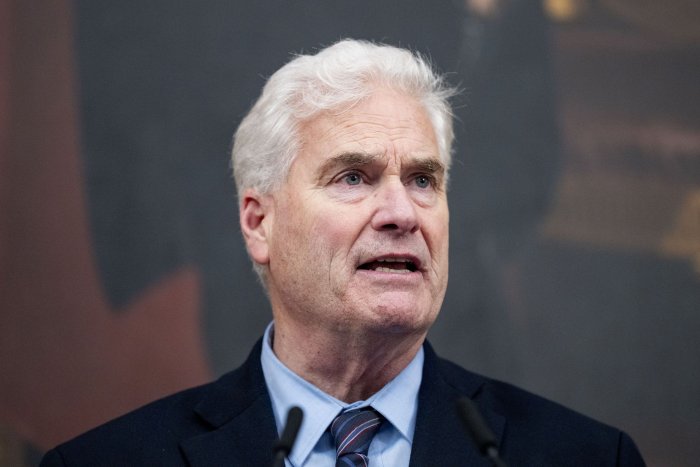July 24 (UPI) — The U.S. Navy needs to complete its shipbuilding program and modernize its weapons systems to effectively address the nation’s defense needs, Adm. Daryl Caudle told the Senate Armed Services Committee.
Committee members questioned Caudle on Thursday morning to consider his nomination for Chief of Naval Operations and reappointment to the grade of admiral.
“I view this nomination as a solemn opportunity to ensure the nation’s maritime dominance never is surpassed by competitors or adversaries,” Caudle told the committee during his opening comments.
“Our sailors are the Navy’s most enduring competitive advantage,” Caudle said. “A stronger Navy means a more effective fleet.”
He said his father was an Army veteran who served in the Korean War and passed on the importance of service to protect American families and their way of life from harm.
Recruitment standards, shipbuilding
Committee Chairman Roger Wicker, R-Miss., said the Navy has lowered its recruitment standards in recent years to enable more people to join its ranks.
He asked how Caudle might ensure the Navy does not permanently rely on lowered standards.
Caudle said the Navy has not lowered its standards but instead has increased access.
“All that graduate from boot camp meet the rigorous standards of that course to the letter,” he told Wicker.
Sen. Angus King, I-Maine, said the Navy has an “overdue” 30-year shipbuilding plan that has not been followed and asked if Caudle would undertake a shipbuilding program to increase the Navy’s size and visibility.
Caudle said King has his “complete commitment” to the Navy shipbuilding program.
Sen. Tim Kaine, D-Va., also raised the matter of the 30-year shipbuilding program and asked if Caudle would commit to completing the program in a timely manner and on budget.
Caudle affirmed he would do so and cited the Navy’s nuclear submarine program as especially important for ensuring the nation does its part to fulfill strategic agreements with other nations.
Sen. Deb Fischer, R-Neb., raised concerns about the Navy’s force structure design to deter other nuclear powers that are threatening the United States and the world.
Caudle called the matter a “math problem” and said he will work closely with Strategic Command to address growing threats from China and other nations to maximize the Navy’s effectiveness.
Munitions and maintenance
Fischer also asked what the Navy could do to ensure it has an ample supply of munitions to quickly replace those that are expended during naval operations.
King said the Navy has “way too many sole-source vendors that are underproducing” munitions due to difficulties with obtaining the materials needed to make them.
“We need to work through that,” King said, adding that the Navy needs to streamline production for greater efficiency.
“We roll a Ford F-150 off the assembly line every 20 hours, but it takes greater than a year to build an SM-6” missile, he added. “It’s just unacceptable.”
Sen. Mazie Hirono, D-Hawaii, asked about drydock construction in Hawaii and what Caudle would do to complete an under-construction drydock there on time to ensure Naval vessels can use it for maintenance and repairs.
Caudle called the drydock a national asset and said he shares Hirono’s concern regarding the importance of the drydock and getting it completed for as close to its budget as possible.
Weapons systems modernization
Sen. Ted Budd, R-N.C., asked how Caudle might incorporate unmanned weapons systems to counter naval growth among the nation’s potential adversaries.
“There is no question that unmanned robotic autonomous systems will be part of any modern warfare going forward,” Caudle answered.
He said they are used in the Russia-Ukraine war, in space and Middle East conflicts.
“We’re all learning from this,” he said. “Everyone is, including our adversaries.”
He said the Navy must invest in robotic autonomous weapons systems and ensure the command structure and operational systems are in place to maximize their effectiveness.
During his questioning, King suggested directed-energy weapons are the “future” of naval warfare and asked Caudle what his position might be regarding their development and use.
“A directed-energy shot is much cheaper than a $4 million missile,” but the Biden administration “grossly underfunded” development of the weapons system, King said.
Caudle responded that his master’s degree is in directed energy and his thesis was on high-powered lasers.
“I’ve not seen the Navy do an adequate amount of effort translating the research and development into shipboard use,” he said.
“If confirmed, I will make that a priority because it is the infinite magazine, especially against certain targets,” Caudle said.
“Admiral, you just got my vote,” King responded.
The morning confirmation hearing lasted for more than two hours.
Before the confirmation hearing, Sen. Jim Banks, R-Ind., met with Caudle and in a news release said the admiral “knows a stronger Navy means a safer America.”
Caudle is a four-star admiral and would replace former Chief of Naval Operations Adm. Lisa Franchetti.
If confirmed, Caudle would control a naval fleet that is 14 times smaller than the Chinese fleet and has experienced costly shipbuilding delays, according to Politico.
